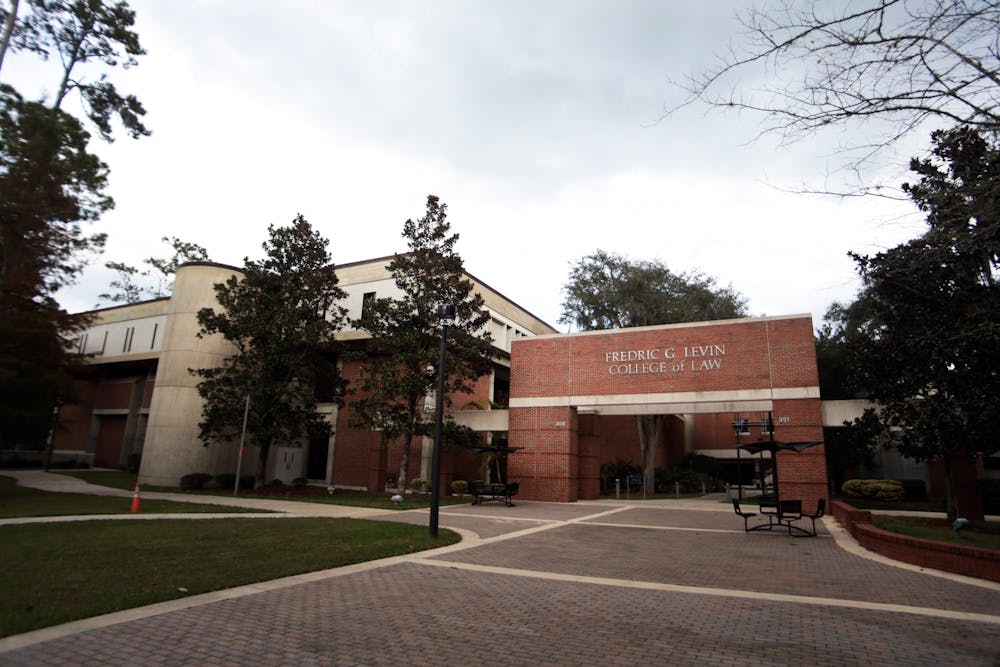For the tens of thousands of dollars some pay to attend the UFs College of Law, the student experience was an integral part of getting the most out of their education — three years ago. Student life took a massive hit during the COVID-19 pandemic.
But the walkways of UF Levin College of Law were lined with tables for over 50 student organizations and professional groups this September. It was the first club fair the college had put on since the COVID-19 pandemic hit in 2020.
As this semester comes to a close, this resurgence at one event has turned out to be part of a greater movement among UF law students, said M Smith, assistant dean for inclusion at the law school. The return of student life to the law school campus was sudden, but it was embraced with open arms by administration.
“It was like we opened the floodgates at the beginning of the semester,” Smith said. “Welcome back to the land of the newly engaged.”
When UF classes went fully online Fall 2020 and Spring 2021 during the pandemic, student life was impacted across the board, Smith said. Many club meetings moved to Zoom, and some organizations fell stagnant without in-person events to rely on.
When campus reopened and classes, clubs and other events returned to in-person or hybrid options during Fall 2021 and Spring 2022, the law school was still quiet. As UF student life attempted to return to normalcy, law students remained cautious, Smith said.
They would head to classes and then go straight back home. It was rare to see someone stop by for lunch in the cafeteria, let alone go to an in-person club meeting. While undergraduate students attended club fairs and tabling events, the majority of the law organizations stuck to Zoom.
The caution was understandable, but the emptiness was disheartening, compared to days when big picnics hosted by students were an everyday occurrence, Smith added.
“It was still a little bit of a ghost town around here,” they said.
For the law school’s 700-person population — which makes it small enough for some to call it “Levin High” — losing that sense of community was a blow. But when Andy Garcia was elected president of the UF Student Bar Association this semester, he made it a goal to bring it back.
The UF SBA works similarly to UF Student Government with elected representatives from each class: first years, called 1Ls; second years, called 2Ls; and third years, called 3Ls. It puts on events for the student body and funds various student organizations.
As a second-year law student, Garcia’s 1L experience had been that dry spell of student involvement during the pandemic.
He wanted to provide a different experience for the incoming class, he said. So he and the rest of his executive board met and decided to more than double the amount of 1L representative seats, from seven to 15.
The move was met with a wave of first-year law students eager to participate, he said. They had 30 candidates for the 15 seats, meaning none went uncontested. Elections were unexpectedly rigorous this semester for Garcia and the rest of the candidates, he said.
With a new set of 40 SBA members, Garcia said the ability for the association to start reaching out to students became much easier. SBA organized a mental health awareness week with events like a field day and an arts and crafts day during October.
It’s now in the process of organizing a diversity week with other student organizations during Spring, something Smith said the law school hasn’t done since the pandemic. It also regularly organizes meet and greets with various faculty and administration to help students network.
“More ideas are floating around,” Garcia said. “There’s more synergy. There’s more happening.”
Improving student life is good for any university campus, but it’s especially important for law students, Garcia said. Each class has a fixed number of A’s, B’s and C’s to give out. For Garcia, that means the competitive aspect of his education can become overwhelming. It can be easy to get caught up in constant competition for grades and jobs, he said.
“That breeds some nasty things in law school,” he said. “And the only way to cope with that is that sense of community.”
Second-year law student Frank Gonzalez agrees, he said.
A friend of Garcia’s, Gonzalez has also been part of the boom in student life as the president of the UF Latino Law Student Association. Affinity groups like LLSA, the Black Student Law Association and OutLaw, the LGBTQ group for law students, have all seen a rise in student engagement this semester, Smith said.
For Gonzalez, a Latino law student, helping LLSA expand has been important to him. Often, the people he interacts with at meetings are first generation students. Forging a community at Levin High with people who understand your culture and your experiences can vastly improve a UF Latino law student’s education, he said.
Now that LLSA’s presence has been solidified, Gonzalez hopes to improve outreach to UF’s pre-law Latino students as well. The executive board is currently organizing a mentor program for LLSA members to form relationships with undergraduate students.
“A lot of these kids are first generation professionals, citizens, immigrants,” Gonzalez said. “They have to make their own strides. That requires experience that you’re not going to have until you meet someone that does.”
Contact Siena at sduncan@alligator.org. Follow her on Twitter @SienaDuncan.

Siena Duncan is the Fall 2024 Editor-in-Chief of the Alligator. She's interned for the Salt Lake Tribune, the Tampa Bay Times and POLITICO. In her spare time, she loves to take walks to see the cows by her apartment and add more to her sketchbook.






